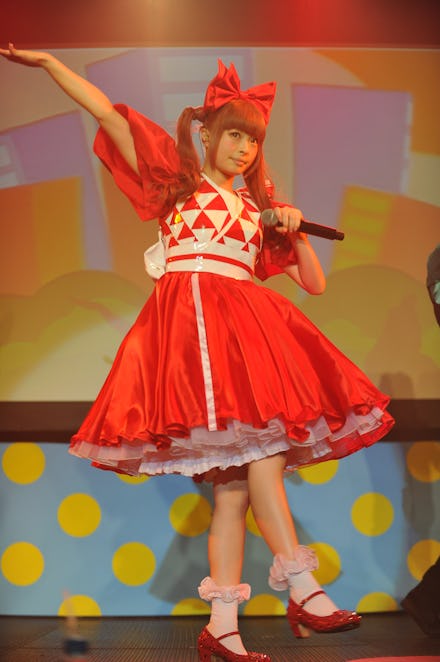This Pop Superstar Is About to Show Americans What Japanese Culture Really Looks Like

A few months ago, pop-punk singer Avril Lavigne released a music video for "Hello Kitty," where she, backed by a group of unsmiling Asian dancers, wore a cupcake costume and repeatedly yelled the word "kawaii." For those not in the know, kawaii is Japanese for "cute." The video was decried for being offensive at best and racist at worst. But the real offense is that it's been done before — by someone much more talented.
If there's one good thing that Lavigne's video produced, it was buzz — and not for her, but for the reigning queen of kawaii, 21-year-old Kyary Pamyu Pamyu. As Lavigne faced a Twitter storm of backlash, fans were quick to point out that her style and aesthetic obviously borrowed heavily from Kyary, who's well-known in Japan and also enjoys a cult following globally, mostly because of her incredibly creative videos, which currently have more than 2.2 billion views. And she's about to break into the American scene in a huge way.
Kyary, who just turned 21, may be an endless fountain of hearts, rainbows and sparkles, but she's also a font of sharp business acumen and innovative talent. Unlike many of her J-pop peers, she was not hand-picked by a modeling agency and then manufactured into a brand. That's the common model these days — take, for instance, girl group AKB48, which is made up of forty-eight members who wear identical costumes and perform the same moves with almost militant rigor.
Kyary, on the other hand, started out as a hardcore Harajuku girl (referring to the district in Tokyo), another concept that might be familiar to Westerners after Gwen Stefani's appropriation of it back in 2004. Kyary was able to leverage her love of the area's fashion and turn it into a blogging job, which led to modeling, and finally, her current singing career.
Her knowledge of style was a huge help in her career. Her first hit in 2011, "PonPonPon," was dedicated as an ode to kawaisa and decora culture, which refer to fashion, beauty and style trends originating from the youthful Takeshita-Dori, the most famous part of Harajuku, which Kyary frequented in her teenage years.
The song was an instant viral success, thanks largely to its danceable, trippy beat, with Kyary delivering her childlike vocals and whimsical, sometimes nonsensical lyrics. The visuals are cute and psychedelic at the same time, ranging from floating eyeballs to dancing toast and spinning unicorns. Although the sensory experience is almost dizzying, Kyary makes it cohere as she delivers it all with wide-eyed sincerity and a bit of edge.
That's what's missing from all the American rip-offs of Japanese culture. They steal a stock idea of kawaii, assuming the style is just the product of a well-oiled machine that churns out "forever young and cute" like Sanrio and other billion-dollar Japanese industries. That's how we come up with American equivalents like Katy Perry (who's actually started to sport schoolgirl skirts recently). But Kyary's art is too complex to be summed up as just cute; in fact, she makes a point of being sinister and creepy.
Kyary says it herself in a 2013 interview with the Wall Street Journal: "I think Hello Kitty and Kyary Pamyu Pamyu are opposite to the extreme. I'm happy to say, the image I am pursuing is a new kind of cute." The art from her previous album, Nanda Collection, shows Kyary playing with body dysmorphia; her designers Photoshopped a giant purple mouth with razor-sharp teeth onto her cherubic face. Her video for "Mottai Night Land," — a play on the word mottainai, roughly translating to "wasteful" — is populated by masked dancers that look like they belong in a Tim Burton film.
"For me, 'traumatic' is the key word. I want to traumatize people out of the way they think. I want to get different reactions. So some people think I'm crazy. But soon they find I'm also addictive. And then they can't get enough of what I do," Kyary said, and she couldn't be more right. With more than 2.1 million Twitter followers, she's Japan's most famous Internet sensation, and her innovative look, sound and concept have attracted such Western fans as Ryan Hemsworth, Ariana Grande and of course, Katy Perry, who's had the pleasure of meeting Kyary as well.
Encouraged by her many fans abroad, Kyary is now ready to drop an album in America too, which will be out on July 29. Called Pika Pika Fantajin, which is a portmanteau of "fantasy" and "people" (jin), it's sure to be as avant-garde as it is adorable. She's already released one music video called "Kira Kira Killer," and it doesn't disappoint.
As Kyary says, "I want to spread the word of kawaii to the rest of the world — I want to see it embraced by everybody. ... Kawaii, to me, is a state of mind." There's clearly an audience for it in the states. It's time we got the real thing.